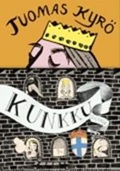 Ylipitkä pakina
Ylipitkä pakina
Suomi on ollut Penttisen suvun hallitsema kuningaskunta ja siirtomaavalta varhaisesta keskiajasta alkaen. Kalle IV Penttisen noustessa valtaistuimelle Suomi on jo siirtomaistaan luopunut demokratia, jossa kuninkaalla on enintään arvovaltaa, eikä Kallella oikein sitäkään. Vantaan vuoden 1996 olympiakisojen isäntämaa, tenniksen suurvalta, avaruustutkimuksen kärkimaa ja taloudellisesti menestyvä hyvinvointivaltio. Se on säästynyt naapurimaiden kauheuksilta, Viron urhealta talvisodalta ja Norjan 1947 Tukholmaan pudottomalta atomipommilta ja Ruotsissa valtaannousseen Punaisen Armeijakunnan pystyttämältä hirmuhallinnolta.
Kalle IV Penttinen on yksinkertainen, sosiaalisesti ja ymmärryskyvyltään rajoittunut liki lukutaidoton kunkku, tissimies kuten hän itsensä esittelee. Hän selviää seremoniaalisista tehtävistään joten kuten hovin ja sen taitavan ja manipulatiivisen lehdistöpäällikön Markku Veijalaisen varjeluksessa pitkään, mutta onnistuu näiden ponnisteluista huolimatta lopulta hölmöilemään itselleen potkut ja lopettamaan samalla koko monarkian maasta. Penaksi pudotettu kunkku joutuu tukityöllistettynä varastomiehenä opettelemaan elämään tavallisen kansalaisen elämää sossun ja muutamien hyvien ihmisten tuella.
Tuomas Kyrö on mm. mielensäpahoittajan tarinoissa osoittanut kertojan lahjansa. Ihan yhtä hyvin ne eivät kirjana kaksijakoisessa Kunkussa yllä oikeuksiinsa. Yhtäällä kirja on ns. kontrafaktuaalisella historiankirjoituksella herkuttelevaa irrottelua, jossa otetaan ilo irti kuulantyöntöön Hella Wuolijoesta, tennistähti Jorma Ojaharjusta, runoilija Olof Palmesta ja lukemattomista muista uusiin rooleihin siirretyistä tutuista nimistä. Tämän hallitsevan julkisivun takana se on samalla myös jonkun koskettavaksikin luonnehtima selviytymistarina.
Kontrafaktuaalisella historiankirjoituksella – joka kysyy mitä olisi voinut seurata jos olisi käynyt toisin kuin todellisuudessa tiedämme tapahtuneen – on oma roolinsa ja se on myös vakavasti otettavien historiantutkijoiden käytössä. En ole niin tosikko historiantutkija ettenkö ymmärtäisi, ettei Kyrö ole tällaista tavoitellutkaan, joten epäonnistumisesta tässä ei häntä myöskään voi moittia. Kysymys onkin jaksaako tämä jatkuva asioiden ympärikääntäminen, joka alussa vielä tuntui hauskalta, kantaa yli viiden sadan sivun mittaisessa romaanissa? Valitettavasti näin ei ole, vaan se alkaa kääntyä itseään vastaan tavalla, joka devalvoi niitä muita ansioita joita kirjalla toki on.
Syyskuu 2013

